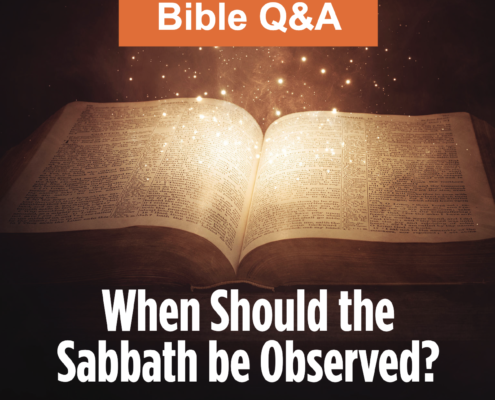The Gospels record over 300 questions that Jesus asked during His ministry. Yet He directly answered only three of the 183 questions that people asked Him. Why? Perhaps because answers satisfy our curiosity and put our minds to sleep. Questions, on the other hand, stir up our thoughts, hassle our consciences and push us to find answers through deeper study. They encourage conversation and investigation. Good questions can be transformative. Jesus’ questions have the power to cut through our assumptions, prejudices and fears to show us what is truly in our hearts. If we prayerfully answer them, Jesus’ questions will transform us.
In Are You Grateful? we looked with fresh eyes at the familiar story of the ten lepers Jesus healed. We saw again the importance of cultivating gratitude in our lives. This week we look at the story from the perspective of the ungrateful nine. Why didn’t they come back to thank Jesus?
“Were there not ten cleansed? But where are the nine? Were there not any found who returned to give glory to God except this foreigner?” Luke 17:17-18
Imagine the conversation of the nine healed lepers as they ran towards Jerusalem.
“Hey guys, did you see that Geshur just went back to see Jesus? What do you think he’s doing?”
“Aww, I don’t know. Let him go. We’re better off without a Samaritan with us anyway.”
“Yeah, it always made me uncomfortable to have a Samaritan with us.”
“Do you think he went back to say thank you?”
“Maybe. But he should! He’s a Samaritan! He shouldn’t expect a Jewish teacher to help him.”
“Should we go say thanks?”
“Not yet. We’d better first make sure the priests say we’re healed.”
“Besides, this could be a fluke… for all we know, we might only look healed.”
“Right. You’ve heard what the priests think of him. They say he’s a fake. I’ve even heard they say He gets His power from Beelzebub.”
“Let’s keep going. If He is real, we’ll probably see Him later and can thank Him then.” So the nine lepers continued on their way, unmindful of the great gift that had been given them.

Loved, but Proud
The nine newly healed but ungrateful lepers were members of the Jewish nation. Since the time of their forefather Abraham, their nation had been the object of God’s special care. He taught them His ways and demonstrated His love for them. He cared for them, protected them and caused them to flourish.
“When Israel was a child, I loved him, and out of Egypt I called My son… I taught Ephraim to walk,taking them by their arms; but they did not know that I healed them. I drew them with gentle cords, with bands of love, and I was to them as those who take the yoke from their neck. I stooped and fed them.” Hosea 11:1,3-4
Yet too often, God’s chosen people had turned their back on Him. Over and over they wandered into idolatry, prejudice, rebellion and selfishness. “My people are bent on backsliding from Me,” God lamented.“Though they call to the Most High, none at all exalt Him.” Hosea 11:7
Their ingratitude and rebellion broke His heart of love. “How can I give you up, Ephraim? How can I hand you over, Israel?.. My heart churns within Me; My sympathy is stirred.” Hosea 11:8
Why did they constantly turn away from the One who loved them so much?
Pride. Foolish, sinful pride blinded their eyes to the mercies of God. “The pride of Israel testifies to his face. But they do not return to the Lord their God, nor seek Him for all this.” Hosea 7:10.

The Jewish people had been blessed with great light from God, but they became proud and ungrateful. Photo credit: www.LumoProject.com
“Christ ever rebuked the Pharisees [and the Jews] for their self-righteousness. They extolled themselves. They came forth from their religious services, not humbled with a sense of their own weakness, not feeling gratitude for the great privileges that God had given them. They were exalted to heaven in point of opportunity, in having the Scriptures, in knowing the true God, but their hearts were not filled with thankfulness to God for his great goodness toward them. They came forth filled with spiritual pride, and their theme was self -“myself, my feelings, my knowledge, my ways.”… Satan deluded the Jews with a natural or legal religion, which was full of selfishness and hypocrisy, and thus were light and knowledge perverted; but this exalting of self, this self-righteousness, is nothing short of deception and self-destruction.” Ellen White, Signs of the Times, December 17, 1894, paragraph 1.
The nine ungrateful lepers, like their fellow Jews, allowed spiritual pride to blind them to their most precious gifts.
Blind Hearts
At the end of the Bible, God gives poignant advice to another group whose spiritual pride has blinded them to God’s mercies.
“Because you say, ‘I am rich, have become wealthy, and have need of nothing’—and do not know that you are wretched, miserable, poor, blind, and naked— I counsel you to buy from Me gold refined in the fire, that you may be rich; and white garments, that you may be clothed, that the shame of your nakedness may not be revealed; and anoint your eyes with eye salve, that you may see. As many as I love, I rebuke and chasten. Therefore, be zealous and repent.” Revelation 3:17-19
God is calling you and I, members of His last-day Laodicean church, to recognize our spiritual blindness and turn to the One who truly loves us. He alone can cleanse us of pride and open our eyes to recognize His bountiful blessings so that we will not be like the nine ungrateful lepers.
“The lesson which is recorded concerning the ten lepers should awaken in every heart a most earnest desire to change the existing order of ingratitude into one of praise and thanksgiving. Let the professed people of God stop murmuring and complaining. Let us remember who is the first great Giver of all our blessings. We are fed and clothed and sustained in life, and should we not educate ourselves and our children to respond with gratitude to our heavenly Father?” Ellen White, My Life Today, p. 170
Living Our Gratitude
It was the Samaritan leper, a man who was not a “church member”, who felt his gratitude for Christ’s mercies most deeply. The nine other lepers were far more privileged in their knowledge of God as members of the Jewish nation. Yet spiritual pride numbed their senses and made them incapable of appreciating God’s blessings.
How often is it like that today? Do new believers show greater gratitude than those who have long been recipients of God’s richest blessings? Perhaps the change wrought by God’s grace is more sudden and obvious for new believers, but is there any reason that those who have long lived by grace should honor God any less with their thanksgiving?
No!
“Every good gift and every perfect gift is from above, and comes down from the Father of lights, with whom there is no variation or shadow of turning.” James 1:17

God graciously gives everything we need for life and godliness. Let’s live out our heartfelt gratitude.
None us deserve God’s goodness. Each of us has been blessed so much! Let’s live out our thankful gratitude in our daily lives. Here’s a few practical ideas for living gratefully:
- Pray: Every day pray for God to open your spiritual eyes to recognize His mercies and see His blessings. “Lord, I want to see!” Luke 18:41 NIV
- Choose: Choose to be thankful. Gratitude and complaining are both choices. Choose the attitude you want, not the one you feel. “I will bless the Lord at all times; His praise shall continually be in my mouth.” Psalm 34:1
- Talk: Learn to talk about God’s blessings. Take every opportunity to share what God is doing in your life. You’ll be blessed and others will be encouraged. “I will praise you, O Lord, among the peoples.” Psalm 57:9
- Journal: Keep a journal of God’s blessings and what you are thankful for each day. Reading through it when you’re low is incredibly encouraging. “I will remember the years of the right hand of the Most High. I will remember the works of the Lord.” Psalm 77:10-11
- Give: Give to others, especially those who don’t deserve it. It’s one of the best ways to express your gratitude to God. “Then the King will answer and say to them, ‘Assuredly, I say to you, inasmuch as you did it to one of the least of these My brethren, you did it to me.’” Matthew 25:40
“Has the light and glory of God arisen upon you? Then rise and shine, showing forth the praises of Him who hath called you out of darkness into his marvelous light. If you are grateful, if Christ has removed your sins as a thick cloud, raise your voice in thanksgiving, and tell of his goodness, and let other churches be encouraged by the good news of the work among us.”
Ellen White, Review & Herald, February 19, 1889, paragraph 6.
Note: Unless otherwise noted, all Scriptures are taken from the New King James Version.
Additional Quotes on Gratitude:
Gratitude Blesses Us: “It is for our own benefit to keep every gift of God fresh in our memory. Thus, faith is strengthened to claim and to receive more and more. There is greater encouragement for us in the least blessing we ourselves receive from God than in all the accounts we can read of the faith and experience of others. The soul that responds to the grace of God shall be like a watered garden. His health shall spring forth speedily; his light shall rise in obscurity, and the glory of the Lord shall be seen upon him. Let us then remember the loving-kindness of the Lord, and the multitude of His tender mercies. Like the people of Israel, let us set up our stones of witness, and inscribe upon them the precious story of what God has wrought for us. And as we review His dealings with us in our pilgrimage, let us, out of hearts melted with gratitude, declare, “What shall I render unto the Lord for all His benefits toward me? I will take the cup of salvation and call upon the name of the Lord. I will pay my vows unto the Lord now in the presence of all His people.” Psalm 116:12-14” Ellen White, Desire of Ages, p. 348
Complaining – a Habit: “We have so long educated our souls to sigh and complain and groan and murmur, that we feel little obligation to magnify the Lord of hosts when he gives us the light and freedom of his Spirit.” Ellen White, Review & Herald, February 19, 1889, paragraph 6.
“Some research suggests that making a habit of complaining can “re-wire” the brain so that those particular thinking orientations become ingrained. It is possible to re-wire this re-wiring to make it more positive, of course, but chronic complainers probably don’t think it would work all that well.” Robert Biswas-Dienerm, The Three Types of Complaining
Show Gratitude to God at Holidays: “Christmas and New Year’s should also be seasons when every household should remember their Creator and Redeemer. Instead of bestowing gifts and offerings in such abundance on human objects, reverence, honor, and gratitude should be rendered to God, and gifts and offerings should be caused to flow in the divine channel. Would not the Lord be pleased with such a remembrance of him? O how God has been forgotten on these occasions. At the very time when his loving-kindness should be remembered, his mercy has been ignored. The lesson of the ungrateful lepers should not be in vain to us. “Were there not ten cleansed? but where are the nine?” Shall only one in ten who are receiving the rich benefits of the Lord, return to bow at his feet and to give praise for his mercies? Shall presents be purchased, and money be expended for unnecessary things, and no wisdom be manifested in the outlay of God’s entrusted means?” Ellen White, Review and Herald, November 13, 1894, paragraph 6.








 DSCN3289
DSCN3289


Leave a Reply
Want to join the discussion?Feel free to contribute!